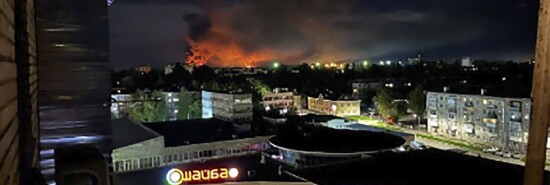
Why Russia is so alarmed by Ukraine’s big drone raid
Tom Rogan
Video Embed
Ukraine launched ambitious drone attacks across Russia overnight Tuesday into Wednesday. Ranging from Pskov, near the Estonian border, to Sevastopol in Crimea, these strikes damaged at least four Russian military transport aircraft, a microelectronics factory, and a fuel depot. As shown in my annotated Google Map below, Ukraine’s drones were able to penetrate various multilayered Russian air defense networks. The red circles indicate confirmed strikes.

These attacks evince Ukraine’s reliance on the United Kingdom as its key strategic adviser. British military doctrine puts significant emphasis on “deep battlespace” operations designed to undermine an enemy’s logistics and command-and-control confidence. These latest drone strikes have certainly achieved that purpose.
DESANTIS SHOWCASES ABILITY TO GOVERN WITH HURRICANE RESPONSE
Embarrassed at its utterly deficient ability to protect Russian territory, the Kremlin is shifting the blame to NATO. Russia’s close ally Belarus, for example, accused two Latvian soldiers of briefly entering its territory at a border checkpoint on Wednesday. But NATO member state Estonia is the particular source of Moscow’s ire.
The Kremlin believes that leveraging the threat of direct military conflict with NATO will pressure NATO states to make Kyiv avoid future strikes on Russian territory. And while that Russian strategy might well succeed were Kyiv listening to Washington more than it is London, the opposite is true. Nor is Estonia weak. Prime Minister Kaja Kallas is a strong leader, and Estonia’s forces and people are resolute. Estonia is well defended by a reinforced British army-led battlegroup and NATO fighter squadrons. To his credit, President Joe Biden has also made clear that any Russian attack on a NATO ally would meet an immediate U.S. military response (the U.S. Army regularly practices responding to a Russian blitzkrieg attack on Estonia).
Yet that hasn’t stopped the Kremlin from going into overdrive. On Wednesday, top propagandist Vladimir Solovyov questioned whether the drone strikes on Pskov were “carried out from Estonian territory.” “If this is true,” he said, “then of course it’s a world war. And if it’s true, then Estonia must be wiped off the face of the Earth. … Estonia simply needs to be hit with air strikes.”
Similar was the argument of Moskovskij Komsomolets columnist Dmitry Popov. Calling for new export restrictions on Estonia, Popov added, “We should not forget that the conflict is a hybrid one. And if, for example, in Estonia now something accidentally explodes, burns, or collapses, then we have absolutely nothing to do with it.” This is a play to previous Russian GRU intelligence service sabotage operations in NATO states such as the Czech Republic.
Of course, the drones that struck Pskov were not launched from Estonia (and would not have needed to transit Estonian airspace). Still, Estonia offers a useful target for Russian ire. Just across the border from Russian President Vladimir Putin’s home city of St. Petersburg, Estonia’s re-absorption into a greater Russia has long been a fetish of Russian nationalist dreaming (including for Putin, personally).
That said, this rising Russian anger toward NATO reflects a trend, coming on the heels of another diatribe from the centrist-turned-raging hawk former President Dmitry Medvedev. Lamenting Ukraine’s pledge to conduct drone attacks across Russian territory, Medvedev referenced the Bible’s Book of Revelation on Tuesday to claim that NATO is now a legitimate military target.
Why is the Kremlin so angry?
Putin’s primary concerns here are twofold. First, while he remains popular with most Russians, Ukraine’s attacks are slowly but steadily undermining Putin’s credibility as a leader who provides order and security. This is a central plank of Putin’s leadership narrative. While Putin might have eliminated the greatest stain on his credibility as a strong leader, Yevgeny Prigozhin, these drones reinforce a perception of his weakness.
CLICK HERE TO READ MORE FROM THE WASHINGTON EXAMINER
Second, Putin’s economy is struggling to support basic logistics needs, such as replacement vehicles and fuel supplies. Neither can Russia maintain production of the most capable missiles and equipment at levels necessary to alter the balance of the war. Underlining this concern, Defense Minister Sergei Shoigu used a Wednesday visit to a radar equipment manufacturer to demand “round-the-clock” production. It’s no surprise, after all, that Ukraine targeted this microelectronics facility. The factory was probably producing components for the targeting and flight elements needed to build out Russian missiles. Western sanctions mean that Russia cannot easily offset shortages of sparse components.
Top line: Ukraine recognizes that these drone strikes reinforce its control of the strategic initiative and undermine Russian morale. As far as Ukrainian drone production allows, expect the strikes to escalate.
